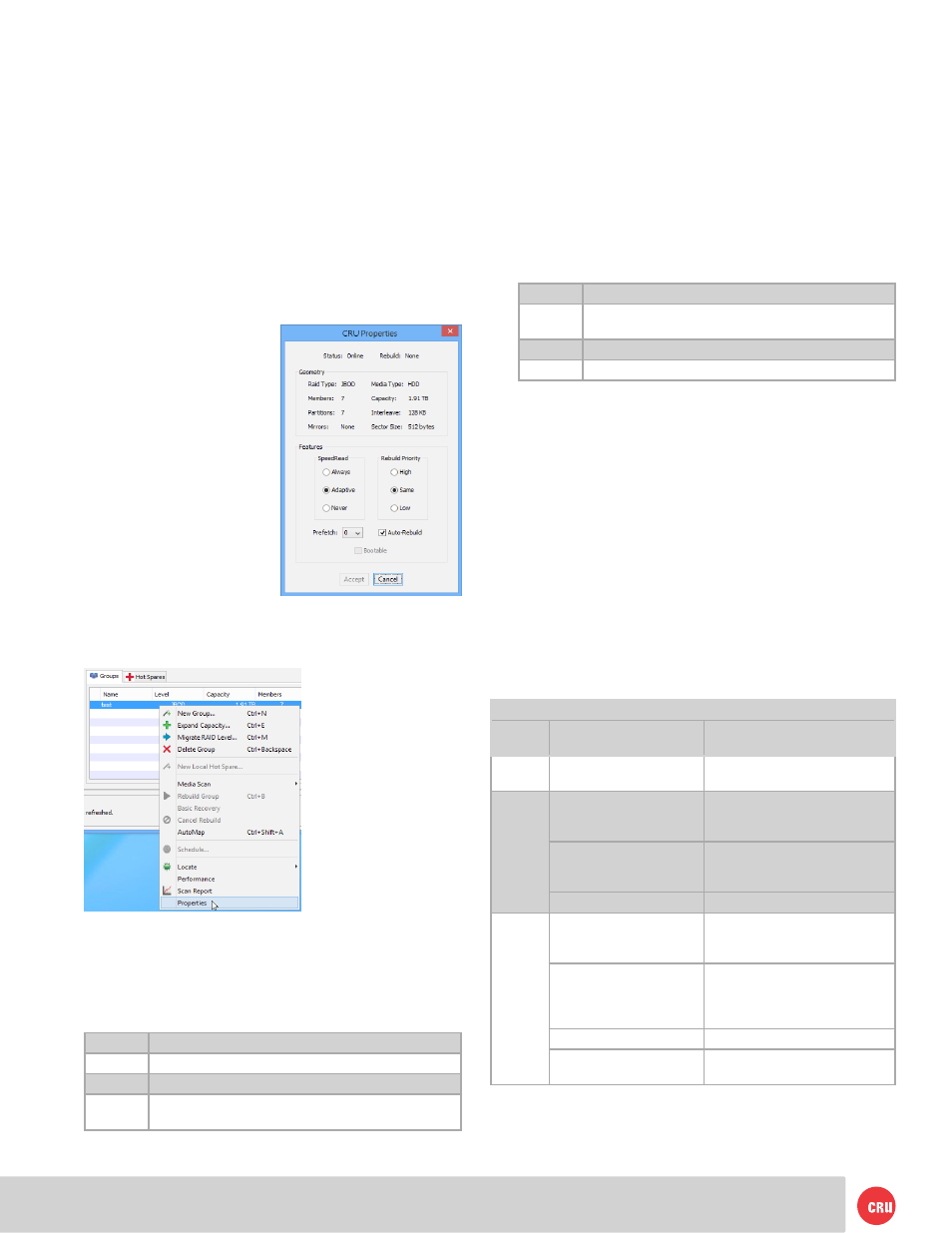6 change raid group properties – CRU RTX800-TR User Manual
Page 6

PMS 711
2 cyan
85 magenta
76 yellow
10.25.12
CRU Mark
Page 6
Auto-Rebuild
Controls the replacement of a faulted drive with any
available unallocated drive. When you click on the
Auto-Rebuild check box and the Accept button, Auto-
Rebuild is enabled. If a drive becomes faulted, the SAS/
SATA RAID storage controller replaces the drive with an
unallocated drive.
Rebuild Priority
Specifies the ratio of rebuild I/O activity to host I/O
activity.
Setting
Description
Same
(default)
Both rebuild and host I/O’s are treated equally
Low
Host I/O is given higher priority
High
Rebuild I/O is given higher priority
Prefetch
Specifies the number of stripes that are read when
SpeedRead is enabled or adaptive. This property can
only be changed after the RAID group is created. To
access this property, select the RAID group and view its
properties.
d. Click Accept.
7 Recovering From a Failed Hard Drive or
RAID Group
Use the chart below to diagnose the issue you are experiencing
and the recovery method you should use to restore the RAID
or recover your data.
Failure Scenario Table
RAID
Level
Reason(s) for Being
Marked Offline
Recovery Method
JBOD/
RAID 1
Any drive failure
Section 7.2: Data Recovery
RAID 1/
RAID 10
Error on one drive
Section 7.1.1: Automatic Replace-
ment or Section 7.1.2: Manual Re-
placement
Mistaken replacement of
good drive when its mirror
has failed
Section 7.1.3: Recovery from Re-
placement of a Wrong Drive
Error during rebuild
Section 7.2: Data Recovery
RAID 4/
RAID 5
Error on one drive
Section 7.1.1: Automatic Replace-
ment or Section 7.1.2: Manual Re-
placement
Mistaken replacement of a
good drive when another
member of its RAID group
has failed
Section 7.1.3: Recovering from
Replacement of a Wrong Drive
Error during rebuild
Section 7.2: Data Recovery
Errors on two or more
drives
Section 7.2: Data Recovery
5.2 Enable Auto-Rebuild
When Auto-Rebuild is enabled, the RTX enclosure will
automatically use any suitable unallocated drive it finds
as a replacement for a faulted drive. Suitable drives must
be large enough to replace the degraded drive and cannot
contain any RAID group information. If a Hot Spare Pool
exists, the RTX enclosure will default to using an available
Hot Spare drive from the pool before searching for an
unallocated drive.
Refer to Section 6 for instructions on how to enable Auto-
Rebuild.
6 Change RAID Group Properties
Some of these properties can
only be specified during the
creation of the RAID group while
others may be changed at any
time during the life of the RAID
group.
a. Use the ATTO ConfigTool
to log in to the
ThunderStream SC
3808E properties as detailed
in Section 3.2.3 , Steps A
through E.
b. Right click on the RAID Group in the Groups panel
listing and click on Properties.
c. Modify the current properties according to your needs:
SpeedRead
Specifies the cache policy used during read operations.
Setting
Description
Never
Read caching is disabled
Always
Read caching is always enabled
Adaptive
(default)
Read caching is adaptively enabled so read performance
remains high
